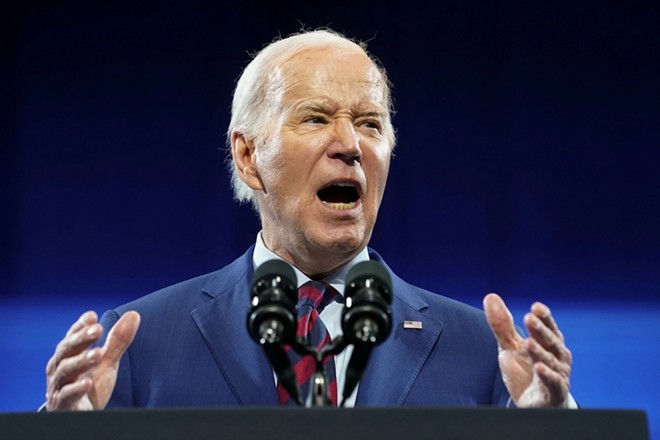
Shutterstock / photosince
Joe Biden speaks from a podium in June of this year.
Sign up for The Brief, The Texas Tribune’s daily newsletter that keeps readers up to speed on the most essential Texas news.
Calls from some Democrats in Congress for President Joe Biden to withdraw from the presidential election have raised questions about how his Democratic replacement would get on the November ballot across the country. State law suggests a new nominee wouldn’t have much of a problem doing so in Texas, if the party acts soon.
The two major parties have until Aug. 26 to submit the names of their presidential candidates for the Texas ballot, giving Democrats five weeks to make changes.
The Texas election code states that the Texas Secretary of State can certify a political party’s replacement nominee for president or vice president if the original nominee withdraws, dies or is declared ineligible by the 74th day before the presidential election day, which is Aug. 23 this year, if the party’s state chair submits the replacement nominee no later than 5 p.m. of the 71st day before the election day, which is Aug. 26.
This means if Biden drops out of the presidential race against Donald Trump, the Democratic Party could select a new nominee during its national convention Aug. 19-22 just in time for the nominee to appear on the Texas ballot.
Biden faces mounting pressure from some fellow Democrats to exit the race after he tripped over words and seemed to lose his train of thought during the June presidential debate. Congressman Lloyd Doggett of Austin was the first member of Congress to come out publicly against Biden. On Friday, U.S. Rep. Marc Veasey of Fort Worth and three other Congressional Democrats urged Biden to “pass the torch” to another nominee.
Biden on Friday vowed to return to the campaign trail next week, according to The New York Times, and Vice President Kamala Harris reassured donors that she and Biden would win the election. This is despite earlier reports that Biden was listening more seriously to the concerns about his candidacy.
The longer Biden waits to withdraw, the harder the logistics of replacing him on the ballot become, according to Votebeat.
Even though Election Day isn’t until Nov. 5, election officials across the country also have to account for state election deadlines and for voters, including members of the military, who will be voting by mail and need additional time to receive and return their ballots. For example, Maricopa County in Arizona said that its ballots need to be finalized by Aug. 22, Votbeat reported.
In Texas, counties manage the printing of their own ballots, and include the names of the candidates given to them by the secretary of state, according to Votebeat.
That office sends those names in late August, after the conventions. Military ballots go out on Sept. 21, and must be printed days ahead of that. Trudy Hancock, the election administrator in Brazos County, told Votebeat that the county’s ballots are typically finished by Sept. 10 to allow for proofing and to account for any delays.
If Biden drops out after ballots are printed, electors – the party representatives who cast their state’s votes for president in the electoral college – could vote for the person the Democratic party nominates as his replacement in states that allow it, Votebeat reported.
To win the presidency in the Electoral College, a candidate must get at least 270 votes from the 538 electors across the country. Each state gets as many electors as it has U.S. senators and representatives in Congress. In most states, including Texas, whoever wins the most votes from voters gets all the Electoral College votes for that state.
In rare instances, some electors have cast votes for someone other than their party’s official nominee, which has stirred some concerns of “faithless electors” in recent years. In Texas, a 2023 update to the state’s election code requires electors to sign an oath that they will vote for the chosen candidate.
Natalia Contreras, Jen Fifield and Jessica Hussman of Votebeat contributed to this story.
This article originally appeared in the Texas Tribune.
The Texas Tribune is a member-supported, nonpartisan newsroom informing and engaging Texans on state politics and policy. Learn more at texastribune.org.
Subscribe to SA Current newsletters.
Follow us: Apple News | Google News | NewsBreak | Reddit | Instagram | Facebook | Twitter| Or sign up for our RSS Feed